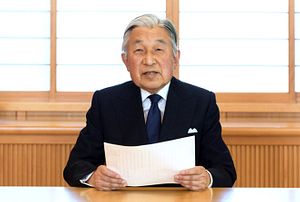Japan’s 82-year old Emperor Akihito expressed his wish to retire in a video-recorded speech broadcasted on television on multiple Japanese TV networks on August 8. Careful to avoid discussing specific ideas to revise the current Imperial succession system, the emperor questioned whether he can properly fulfill his public duties as the symbol of the state at his advanced age.
“I am already 80 years old, and fortunately I am now in good health. However, when I consider that my fitness level is gradually declining, I am worried that it may become difficult for me to carry out my duties as the symbol of the State with my whole being as I have done until now,” the emperor said.
He noted that he began to see a decline in his fitness levels following two surgeries—he had to undergo treatment for prostate cancer in 2003, and heart disease in 2013–which made him reflect upon his duties and the future of the imperial system. Akihito acceded to the Chrysanthemum Throne in January 1989, following the death of his father, Emperor Hirohito.
While common prior to the 19th century, the current Imperial succession system obliges an emperor to serve until his death. Japan’s emperor is strictly prohibited by the country’s constitution to interfere in political activities including suggesting revisions to the current succession rules for ascending the Chrysanthemum Throne. As a consequence the emperor could only do so in the most indirect words in the address.
“When the Emperor has ill health and his condition becomes serious, I am concerned that, as we have seen in the past, society comes to a standstill and people’s lives are impacted in various ways. The practice in the Imperial Family has been that the death of the Emperor called for events of heavy mourning, continuing every day for two months, followed by funeral events which continue for one year,” the emperor said.
“These various events occur simultaneously with events related to the new era, placing a very heavy strain on those involved in the events, in particular, the family left behind. It occurs to me from time to time to wonder whether it is possible to prevent such a situation,” he added.
“It is my hope that by thoroughly reflecting on our country’s long history of emperors, the Imperial Family can continue to be with the people at all times and can work together with the people to build the future of our country, and that the duties of the Emperor as the symbol of the State can continue steadily without a break. With this earnest wish, I have decided to make my thoughts known.”
In order to accommodate the emperor’s wishes, the Japanese Diet would have to revise the Imperial Household Act of 1947, the statute governing the line of succession of the oldest continuous hereditary monarchy in the world.
“I would like to take seriously the fact that the Emperor addressed the nation,” Japanese Prime Minister Shinzo Abe said. “Given the age of the Emperor and the burden of his duties, I believe we need to think what grievance it causes him and what we can do.”
Abe is expected to set up a panel of experts within the Cabinet Secretariat to debate the matter. Based on the panel’s recommendations the diet could draft new legislation to revise the Household Act. However, this would likely spark controversy, particularly among right-wing politicians and their supporters. Emperor Akihito is widely seen as a moderate influence on Japan’s far-right and a guardian of Japan’s pacifist national identity.
In a July poll conducted by Kyodo News Agency, 85 percent of respondents spoke out in favor of revising the law to allow abdication. The emperor’s oldest son, 56-year-old Crown Prince Naruhito, is first in line to the Chrysanthemum Throne. His younger brother, Prince Akishino, started a debate in 2006 about whether a retirement age should be set for an emperor. However, this debate did not result in a revision of the law. The current legislation also prohibits women from inheriting the throne.
Correction: An earlier version of this article mistakenly cited July 8 as the time of the Emperor’s television broadcast.

































